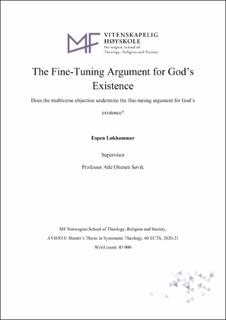| dc.description.abstract | In the late 1950s, astrophysicists discovered that the universe seemed fine-tuned for life, a discovery that has resurrected the design argument for God’s existence. The leading objection to this design argument for God’s existence is the multiverse objection – causing the current consensus that fine-tuning is either explained by a multiverse or design. This thesis will contribute to the discussion by assessing the research question: Does the multiverse objection undermine the fine-tuning argument for God’s existence? To evaluate this research question, tools valued by analytic philosophy of religion will be utilized. The thesis is carried out through (1) formulating fine-tuning arguments, (2) presenting the multiverse objection, and (3) considering objections to the multiverse by first addressing two preliminary arguments against any multiverse model and later dividing the multiverse into two models: the unrestricted and the restricted. I argue that the unrestricted multiverse is the least parsimonious hypothesis possible and it faces three forceful critiques. First, it postulates the existence of an actual infinite, leading to the possibility of certain counter-intuitive scenarios. Second, it leads to skepticism because it undermines the value of simplicity, known as Ockham’s razor, and removes the only possible response to the Humean skeptic of induction. Third, I provide a novel self-formulated argument that the fine-tuning evidence itself provides a reason for rejecting the unrestricted multiverse. Against the restricted multiverse, I argue that it seems to need fine-tuning of its fundamental laws of nature. In addition, it leads to two wrong predictions: first, that we live in a simulation, and second, that we should be a Boltzmann Brain – a minimal observer. Because of these problems with the multiverse theories, I conclude that the multiverse objection does not undermine the fine-tuning argument for God’s existence. | en_US |
